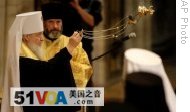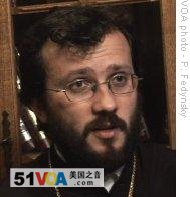Non-Russians Help Choose Russian Orthodox Leader
Update Required
To play the media you will need to either update your browser to a recent version or update your
Flash plugin.
By Peter Fedynsky
Moscow
26 January 2009  |
| Leaders of Russian Orthodox Church, 25 Jan 2009 |
The Russian Orthodox Church is in the process of selecting a new Patriarch for the first time since the collapse of the Soviet Union. Taking part in the two-stage vote are not only church hierarchs, but laypersons and a large number of Orthodox believers who are not Russian citizens. Church leaders cast secret ballots Sunday to select three candidates to replace Patriarch Alexei the Second, who died in December. He became head of the Church in June 1990, 18 months before the collapse of the USSR. Metropolitan Isidor of Yekaterinburg and Kuban announced the result in Sunday's Bishop's Council, which precedes the broader Local Council that convenes Tuesday in Moscow. He says the interim Patriarch and Metropolitan of Smolensk and Kaliningrad, Kirill, received 97 votes. The Metropolitan of Kaluga and Borovsk, Kliment, received 32 votes; and the Metropolitan of Minsk and Slutsk, Filaret, 16. Filaret has been church leader in Belarus since 1978 and is older than the two candidates from Russia. The 62-year old Kirill is considered the favorite, but analysts say his elevation is not a forgone conclusion. The head of the Religion and Law Institute at the Russian Academy of Sciences, Roman Lunkin, told VOA that Kirill played a key role in uniting the Russian Orthodox Church with churches beyond the borders of Russia and will therefore win many non-Russian votes. But he is seen as a modernizer and could face opposition from traditionalists that could favor Kliment. Lunkin adds that Ukrainian support is critical for any candidate and says the result could depend on how the Ukrainians vote, because they hold about one-third of the total ballots given to bishops and laypersons. The Metropolitan of Ukraine's Moscow-oriented Church, Vladimir, withdrew his candidacy for the Russian Patriarchate last week, saying he would prefer to stand before God as the 121st Metropolitan of Kyiv rather than the 16th Patriarch of Moscow. But Lunkin suggests a political context to Vladimir's statement. He says the Moscow Church hierarchy understands the stakes for the Ukrainian Church if a strong leader like Vladimir were to leave his position. Lunkin says a struggle [to replace Vladimir] would doubtlessly erupt among various candidates, new bishops and young members of the hierarchy, of whom there are many in Ukraine. This struggle, he says, is pitted against a backdrop of Ukrainian Orthodox separatists who are also fighting the Moscow-oriented Ukrainian church, making it imperative that Vladimir remain in place for as long as he can lead. Ukrainian Orthodoxy is split between those who favor canonical ties with Moscow and others who see the Russian church as an instrument of Russian imperialism.  |
| Archimandrite Kyril Hovorun |
The spokesman for Ukraine's Moscow-oriented Church, Archimandrite Kyril Hovorun says it helps reduce political tensions between the country's pro-Western and pro-Russian regions. The archimandrite says the Ukrainian Orthodox Church unites those who support Ukraine's European choice and those who favor the Russian choice. He claims his church is one of the few institutions in Ukraine that has the potential to unite the east and west of Ukraine. The final vote, expected no later than Thursday, will be expanded to include laypeople, monks, and even businessmen, who may not necessarily favor the winner of the first round. Vladimir Ryakhovsky, co-chairman of the Russian Orthodox Union, adds that not all of the participants are necessarily religious. Ryakhovsky says the laypersons should be people involved in religion, and who participate in community life, and not because they are part of some business elite. So what emerges is a bit of a political struggle. The winner of this week's vote will succeed Patriarch Alexei, who maintained close ties with the Kremlin and oversaw the revival of Russian Orthodoxy after 70 years of religious persecution in the former Soviet Union.



